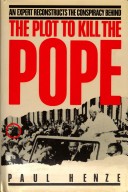Difference between revisions of "Paul Henze"
(→Career) |
(→Career) |
||
| Line 12: | Line 12: | ||
:1974 - 1977: CIA Chief of Station Turkey (AKA 1st secretary, American embassy, Ankara, Turkey) | :1974 - 1977: CIA Chief of Station Turkey (AKA 1st secretary, American embassy, Ankara, Turkey) | ||
:1977 - 1980:CIA representative to the NSC office in the White House <ref name="Herman"/> | :1977 - 1980:CIA representative to the NSC office in the White House <ref name="Herman"/> | ||
| − | 1981 -- 1982 Wilson fellow, [[Smithsonian Institute]], 1981-1982 | + | :1981 -- 1982 Wilson fellow, [[Smithsonian Institute]], 1981-1982 |
| − | 1982 - resident consultant, [[Research and Development Corporation]]<ref name="Henze">Prabook [https://prabook.com/web/paul_bernard.henze/514695 Paul Bernard Henze]. Accessed 26 February 2020.</ref> | + | :1982 - resident consultant, [[Research and Development Corporation]]<ref name="Henze">Prabook [https://prabook.com/web/paul_bernard.henze/514695 Paul Bernard Henze]. Accessed 26 February 2020.</ref> |
==Work== | ==Work== | ||
Revision as of 14:29, 26 February 2020
Paul B. Henze is a former CIA station chief in Turkey who became a National Security advisor to President Carter. After his retirement he became a terrorism expert and was one of a group of right-wing experts associated with the Center for Strategic and International Studies during the 1980s. [1]
Contents
Career
- 1950 -- 1951: US Department of Defense, Foreign Affairs Advisor (Henze: 'began his long CIA career under Defense Department cover as a “foreign affairs adviser” in 1950.'[2]
- 1952 -- 1958: policy adviser, Radio Free Europe, Munich
- 1958 -- 1959 communications adviser, Turkey
- 1960 -- 1961 member senior research staff, Operations Research Office, Johns Hopkins
- 1961 -- 1968 executive, Department of Defense
- 1969 -- 1972 CIA Chief of Station Ethiopia (AKA 1st secretary, American embassy, Addis Ababa, Ethiopia)
- 1973 Department of State, Washington
- 1974 - 1977: CIA Chief of Station Turkey (AKA 1st secretary, American embassy, Ankara, Turkey)
- 1977 - 1980:CIA representative to the NSC office in the White House [2]
- 1981 -- 1982 Wilson fellow, Smithsonian Institute, 1981-1982
- 1982 - resident consultant, Research and Development Corporation[3]
Work
Demonising the Soviet Bloc
According to Edward S. Herman and Frank Brodhead, Henze was one of the peddlers of a conspiracy theory attributing the attempted assassination of John Paul II to the Bulgarian secret service. along with the journalist Claire Sterling and the neoconservative Michael Ledeen. Herman and Brodhead write that: 'The most important investigative work -- or, we should say, creative writing -- in establishing the hypothesis of the Bulgarian Connection was done by Claire Sterling, Paul Henze, and Michael Ledeen.' [4]
Affiliations
- Center for Strategic and International Studies
- Central Intelligence Agency
- Radio Free Europe
- Rand Corporation
- Foreign Area Research Inc. - Vice President
- Center Asian Foundation - Vice president.
- American Turkish Foundation - Trustee.[3]
Contact, References and Resources
Resources
- List of RAND Corporation publications (Accessed: 16 January 2007)
- Online Archives of California Paul Henze Papers, Hoover Institution.
Publications
- Paul B. Henze, International Terrorism and the Drug Connection, Ankara - University Press, 1984.
- Paul B. Henze, The Plot to Kill the Pope, Simon & Schuster, ISBN: 0684183579, 1985.
References
- ↑ see Center for Strategic and International Studies, extract from The "Terrorism" Industry
- ↑ 2.0 2.1 Edward S. Herman and Frank Brodhead, The Rise and Fall of the Bulgarian Connection, Sheridan Square Publications, May 1986, p. 146.
- ↑ 3.0 3.1 Prabook Paul Bernard Henze. Accessed 26 February 2020.
- ↑ Edward S. Herman and Frank Brodhead, The Rise and Fall of the Bulgarian Connection, Sheridan Square Publications, May 1986.
